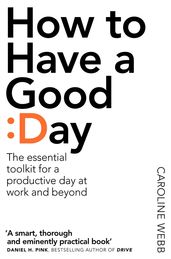Synopsis
In How to Have a Good Day, economist and former McKinsey partner Caroline Webb shows readers how to use recent findings from behavioral economics, psychology, and neuroscience to transform our approach to everyday working life.
Advances in these behavioral sciences are giving us ever better understanding of how our brains work, why we make the choices we do, and what it takes for us to be smart and savvy. But it's not always been easy to see how to apply these insights in the workplace – until now.
In How to Have a Good Day, Webb explains how three big scientific ideas can help us be at our best every day. She shows us exactly how to apply this science to our plans, tasks and conversations, in step-by-step guidance that allows us to:
– Set better priorities
– Make the hours go further
– Turn every interaction into a success
– Strengthen our personal impact
– Be resilient in the face of setbacks
– Sustain our energy over the course of the day
Webb teaches us how to be at our best under pressure, and gives us specific tools to tackle common work challenges – from conflict with colleagues, to dull meetings and packed inboxes.
Filled with stories of people who have used Webb's insights to boost their job satisfaction and performance at work, How to Have a Good Day is the book so many people wanted when they finished Nudge, Blink and Thinking Fast and Slow, and were looking for practical ways to apply this fascinating science to their own lives and careers.
A remarkable and much needed book, How to Have a Good Day firmly delivers on its promise, showing us all how to have a lifetime of good days.
'Wise, fun and humane. The best behavioural self-help book by far. Everyone should read it.' - Cass R. Sunstein, co-author of Nudge
Details
Reviews
How to Have a Good Day is an extraordinary book - a wonderful mix of science, practical advice, and stories based on Caroline Webb's years of experience helping a huge range of people transform their professional lives for the better. Every chapter is studded with engaging real-world examples that ring true and illustrate how to make the most of the book's suggestions. Whatever your personal definition of a good day, you'll have more of them after reading this book.
How to Have a Good Day is a smart, thorough, and eminently practical book. Just about every page offers a science-based tip to help you become better off - or, in many cases, just plain better.
The quest for self-improvement usually takes place on a well-trodden path, with many different gurus offering guidance. But the advice, in addition to being contradictory, often lacks solid foundations. Fortunately, How to Have a Good Day is the breakout exception to this category. The evidence and examples packed inside its pages leave the reader in no doubt that Webb's advice will make a real difference. Better days lead to better lives, and this extraordinary book will lead to both.
Behavioral science has come of age in recent years, and it has begged for a world-class translator. Now we have one. Caroline Webb's peerless translation of the behavioral sciences into tools for shaping the quality of our day is the book we've been waiting for. Play with just 2% of the ideas in this book, and you might just end up changing your life's course. Words like 'magisterial' come to mind. Bravo.



